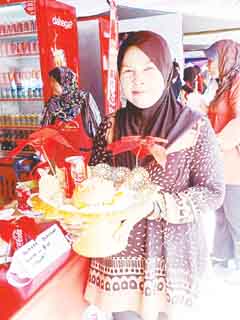Helping rural women to be better entrepreneurs
Published on: Tuesday, December 23, 2014

KOTA KINABALU: Women do 66 per cent of the world's work,but only earn 10 per cent of the world's income. Although women are grossly underpaid, they are found to reinvest 90 per cent of their income into the wellbeing of their family and community. Such were the findings of the study by the United Nations Children's Fund (Unicef).
ADVERTISEMENT
Until the second quarter of 2014, 53.7 per cent of the Malaysian workforce comprises women, according to a report by the Women, Family and Community Development Minister. The government is working towards increasing the figure to 55 per cent by 2015. It is undeniable that women today play multiple roles – as wives, mothers, daughters, breadwinners and social workers. But how do we provide for them better job prospects, while at the same time ensuring that they are able to meet the daily commitments to their families? The Coca-Cola Company has decided to meet the challenge through its '5by20' programme, where it aims to empower five million women entrepreneurs worldwide by 2020.
ADVERTISEMENT
The beverage company that operates in 200 countries globally launched the programme in 2010, in recognition of women's role in economic development. The programme focuses on three key areas, namely business skills training, access to credit and developing networks of peers and mentors.
ADVERTISEMENT
Until today, 5by20 has been implemented in 44 countries including Brazil, China, Haiti, Mexico, Egypt and Indonesia. Malaysia is the latest country to join the list, after the launch of 5by20 in November. Malaysia's 5by20 programme is known as SURI (Sertai Usahawan Realisasi Impian), and is a collaboration with the Women, Family and Community Development Ministry. Its Deputy Minister Datuk Azizah Datuk Seri Panglima Mohd Dun officially launched the programme and presented the graduation certificates to the pioneer group of the programme, last month. "Women, especially in rural communities, form the backbone of the country, but there are still significant barriers that they face in growing a business or supporting their families. We hope to empower and equip them to become productive citizens who will contribute socially and economically to Malaysia," Azizah said in her speech. Suri@Coca-Cola was first introduced in Malaysia in Beaufort. It was opened to women petty traders in rural areas within the district, with the aim of developing their entrepreneurial skills so that they would eventually be able to improve their socio-economic status. The project launched in June this year involved 132 women from Sipitang, Menumbok, Kuala Penyu, Membakut, Limbawang, Bongawan and Beaufort town. Participants are trained for 10 hours over five weeks in areas such as identifying gender issues in entrepreneurship, business planning, managing finances and learning to apply for loans. "I believe that SURI participants would one day not only succeed in opening up grocery stores or food stalls, but in expanding their business into a mini market, a five-star restaurant or sales stockist in their districts," she said.Azizah said the success of the programme has inspired the ministry to expand it nationwide. The General Manager of Coca-Cola for Singapore, Malaysia and Brunei, Gill McLaren said the company believed that women were able to correct economic and social imbalances if given the chance. "This is why we chose to empower them, and not to merely given to them. We are hoping for a long-term positive change, and not a one-off aid," she said. She said the company was also involved in other programmes to improve the living standards on those in the state, particularly in providing clean water supply to residents of Ranau, Kota Marudu, Pulau Mabul, Pulau Denawan and Penampang. "Our aim is to train 20,000 women entrepreneurs in Malaysia by 2020. It is achievable, as there are many women entrepreneurs out there," said Gill. For the graduating participants of SURI@Coca-Cola, their graduation day was as lively as a university's convocation. Many of them had never had the chance to pursue higher education or even finish schooling, thus making the experience a deeply meaningful one. One of the graduates, Dayang Ku Supiah Pengeran Sakibas, 40, said prior to joining the programme, she was selling "soto" and drinks in a small stall in Kampung Kukut, Limbawang. "I used to not even do any kind of bookkeeping – the concept of business overwhelmed me. I did not know where my money went. Through the programme, I befriended more people, learned more recipes and started selling burgers, "ikan bakar" (grilled fish) and roasted chicken. "Now I find my customer base increasing. I used to earn RM30 a day, but today, it can be as much as RM200 a day," said the mother of five who has been doing business for the past 10 years. Meanwhile, Rijah James, 26, who runs a food business with her in-laws, used to find it difficult to manage her household and business at the same time. "My life used to be really chaotic. My husband was working, my children had to be managed and I had to prepare for my business. After joing Suri, I learned how to keep everything in order," she said. The module "gender issues in entrepreneurship" helped her manage her household and business in a more organised manner. Stay up-to-date by following Daily Express’s Telegram channel.
Daily Express Malaysia




